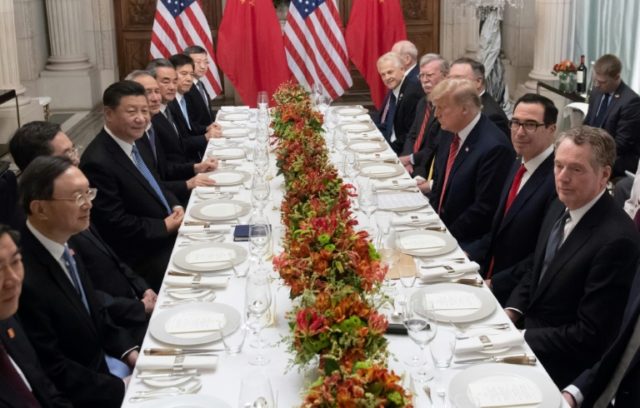Buenos Aires (AFP) – The United States and China on Saturday announced a ceasefire in their tariffs war, hours after US President Donald Trump upended another international forum by snubbing G20 action on trade disputes and climate change.
Over a dinner of steaks and Argentine wine in Buenos Aires, Trump and President Xi Jinping brokered a truce to ensure that — for now — there will be no further escalation to their tit-for-tat imposition of tariffs on goods worth hundreds of billions of dollars.
Trump withdrew his threat to raise the US tariffs even more on January 1, in return for a promise from China to buy more US goods and enter into a 90-day period of talks to resolve their differences.
Those include market access for US companies and protecting their intellectual property from theft by Chinese rivals.
Absent agreement in that time, tariffs now set at 10 percent will be raised to 25 percent, according to a White House statement.
“This was an amazing and productive meeting with unlimited possibilities for both the United States and China,” Trump said in the statement, released as he flew home from a stormy trip spent accosting his fellow leaders at the world’s pre-eminent economic forum.
Chinese Foreign Minister Wang Yi told reporters in Buenos Aires: “It is conducive not only to the development of the two countries and the well-being of the Chinese and American people, but also to stable growth of the world economy.”
The Sino-US trade war sparked warnings at the G20 of the cost to the global economy if it continued unabated. Not long before the Trump-Xi dinner, the annual summit concluded in the Argentine capital with a watered-down statement.
The G20 communique was finally adopted after all-night haggling by negotiators ensured that the summit in crisis-hit Argentina at least finished with a joint platform, unlike recent G7 and Asia-Pacific summits where Trump’s objections caused unprecedented breakdowns.
Apart from the United States, all other G20 members agreed to implement the “irreversible” Paris Agreement on climate change, ahead of a UN summit on the planetary threat starting next week in Poland, it said.
But it said the “United States reiterates its decision to withdraw from the Paris Agreement,” mirroring the divergence seen last year when Trump shocked the global community by bucking the consensus at his first G20.
– Credibility in question –
The statement also omitted pledges by the G20 to fight protectionism and uphold multilateral trading rules, which used to be a mainstay of the world’s leading economies pre-Trump.
Instead, it merely recognized the “contribution” of the “multilateral trading system,” and added that it was “falling short” in goals of growth and job creation.
“The United States, which is the most open economy in the world, does not accept being shackled,” the summit’s host, Argentine President Mauricio Macri, told a news conference.
The G20 agreed to reform the World Trade Organization, which is accused by Trump of limiting US commercial freedoms to the advantage of China and other rivals.
But the conclusions were dismissed as “the lowest common denominator” by Thomas Bernes, a senior fellow at the Centre for International Governance Innovation in Canada who used to be a G20 negotiator for the Canadian government.
“It was the weakest communique we’ve ever seen from the G20,” he told AFP, contrasting the group’s posture now in the Trump era to its sense of common purpose when the leaders first met 10 years ago in the midst of a financial crisis.
– Black Sea, black gold –
Trump’s determination to plow on with his “America First” agenda stands in contrast to the alliance-building presidency of George H.W. Bush, whose death Friday triggered warm tributes from European leaders including Merkel and French President Emmanuel Macron at the G20.
Trump said his predecessor’s passing would prevent him from holding a post-summit news conference, “out of respect” for the Bush family.
It was Trump’s second cancellation at the summit after he pulled out of a meeting with Russian President Vladimir Putin, citing Russia’s recent seizure of three Ukrainian vessels off Crimea, although the two did cross paths at a G20 dinner.
The White House characterized that encounter as an informal chat, but Putin gave it more significance.
“We spoke standing up. I replied to his questions about the incident in the Black Sea,” Putin told reporters, after coming under pressure over the issue from Merkel and Macron at meetings in Buenos Aires.
Putin said it was “a pity” that he had not been able to have a proper meeting with Trump at the G20. “I think that one is really necessary. I hope that we can meet when the US side is ready for it.”
The Russian leader had a more productive dialogue in Buenos Aires with Saudi Crown Prince Mohammed bin Salman.
He greeted the crown prince as a long-lost friend — ignoring Western opprobrium over the prince’s alleged role in the murder of a dissident Saudi journalist in October.
Russia and Saudi Arabia are the world’s two leading exporters of crude, and Putin said they had agreed to extend a pact on oil production cuts, as prices slump on global markets.
That will resonate on the markets when trading in “black gold” resumes on Monday, as will the ceasefire to Trump’s trade war with China.

COMMENTS
Please let us know if you're having issues with commenting.